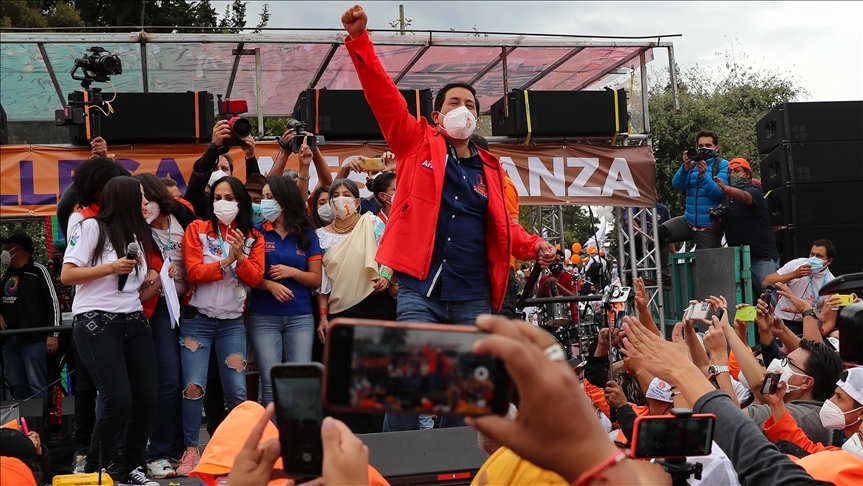The first round of Ecuador’s presidential elections has secured a spot in April’s runoff for Andrés Arauz, a progressive politician and heir apparent to the social-democratic mantle of former president Rafael Correa. With a slew of candidates facing off in a tight race for second place, it still remains to be seen who will run against Arauz in April.
At the moment, it is expected that Arauz, who won just 32 percent of the votes in the first round, will run against Guillermo Lasso, a right-wing neoliberal banker who garnered 19 percent of the votes in February’s elections. It is not out of the question, however, that Lasso may be pushed out of second place by Yaku Pérez, of the indigenous party Pachakutik, who also secured about 19 percent of the votes in the first round. Meanwhile, widespread claims of voting irregularities are calling the results of the elections into question, and Pérez has called for a partial recount.
The results of this election, which signal a widespread rejection of the neoliberal austerity policies of President Lenín Moreno, will have an impact far beyond Ecuador’s borders. The popularity of candidates like Arauz and Pérez is in line with the continued success of other left-wing parties in the region, such as Bolivia’s MAS, which recently won a victory against the country’s coup government. This trend signals renewed illusions in a return to the glory days of Latin America’s post-neoliberal governments as the solution to the misery of a right-wing neoliberal advance.
An Election of Polarization
Before the chaos of the runoffs, Ecuador’s elections were characterized by two narratives: one in support of a return to Correa’s political vision, a tendency better known as Correísmo, and the other embodied in a slew of candidates from across the political spectrum forming the anti-Correist opposition.
With Correa barred from candidacy after being charged with corruption, Correa’s supporters placed their hopes in Arauz, calling his campaign the “return of hope,” or at least the “lesser evil” against Moreno and his ilk. “Simply compare the previous government [of Correa] with this one and think of a time when we were better off,” the logic goes. But Arauz was not the only one trying to claim Correa’s legacy; the staunchly neoliberal candidate backed by Moreno, Lasso — who formed an alliance with the Social Christian Party (PSC) of Jaime Nebot — also tried to paint his candidacy as the continuation of Correísmo, claiming that Moreno was backed by Correa when he first ran.
What this debate amounts to is an attempt by both sides to blame each other for Ecuador’s perilous economic and political state, which has come to a head under Moreno’s government. His administration’s austerity policies and negligent response to the pandemic, coupled with the country’s rising debt and massive anti-government protests in recent years, have raised the stakes of this election, posing a return to the Correa era against a continuation of Moreno’s neoliberalism. In other words, the election is centered on two tendencies: Correísmo and anti-Correísmo. But in the absence of a program that actually questions the interests of capital and the capitalists who were the prime beneficiaries of Moreno’s austerity, the Correist current can do nothing more than try to paint itself as “the lesser evil” compared with the anti-Correists.
This polarization is further intensified by the political and legal persecution and anti-democratic measures employed against Correa. The reality is that a good part of the advance against Correísmo took place under the government of Moreno, who contradictorily came to power as Correa’s “dauphin.” Moreno painted his presidency as “continuity with change,” but this merely signified a turn to neoliberal political positions and alliances with more right-wing forces, such as Lasso and Nebot in the National Assembly, especially after the protests of 2019.
The Pitfalls and Betrayals of Correísmo
Lasso has the support of capital, Moreno, and the rest of the political establishment in his aspirations to challenge Arauz in the second round of the elections. Continuing a tendency throughout Latin America in recent elections, this would pit a center-left candidate against a more traditional neoliberal one. If, however, Lasso is pushed out by Pérez, Ecuador will be faced with a very different scenario, in which a Correist candidate faces an anti-Correist challenger from the Left. Although Pérez has painted himself as an environmentalist and pro-indigenous rights candidate, his political program is far from being a left alternative to Arauz’s project.
If elected, Arauz would represent a return to Correa’s “citizens’ revolution,” a project that refused to transform the country’s structural bases of debt and dependence on foreign “aid.” Correa maintained a strict adherence to extractivism and the process of dollarization initiated by President Jamil Mahuad to bail out big banks. His presidency also implemented harsh repressive and authoritarian measures against Ecuador’s working people and indigenous populations. While some sectors of Arauz’s base recognize these limitations of Correísmo, they argue that Arauz is still the “the lesser evil.”
But Ecuador is not facing the same economic conditions that it did 10 years ago, when Correa rose to power. Its national debt, which rose considerably under Correa’s government, grew exponentially under Moreno. Further, as a result of the Covid-19 pandemic and the government’s botched response to the health crisis, Ecuador’s GDP dropped by 10 percent in 2020.
When he leaves office, Moreno will leave behind the burden of IMF loans and his devastating austerity measures. These measures, which meant direct attacks on the rights and living standards of the working class and poor in Ecuador, created an untenable social and political situation that exploded in mass protests in 2019. These protests finally forced Moreno to rescind some of the terms of the IMF package.
The Covid-19 pandemic, coupled with Moreno’s abysmal response, has only made conditions worse. An already weak, underfunded, and privatized healthcare system was pushed to the breaking point as the pandemic hit Ecuador. Measures to fight the outbreak disproportionately affected the vast population of “informal” workers in Ecuador who lost their jobs. The pandemic has even paralyzed 70 percent of businesses and left 600,000 people unemployed.
The Moreno government responded to the ensuing recession by taking on a new IMF loan, in exchange for central bank deregulation and conforming fuel prices to world market prices. It also took a $3.5 billion bilateral loan from the Trump administration in exchange for privatizing a major oil refinery and parts of the country’s power grid, excluding China from its telecommunications development.
This means that if Arauz wins in April, he will take over with a $52 billion foreign debt.
Even after taking on these multilateral loans last year, Ecuador will need more than $7 billion in new financing in 2021, according to an IMF report. According to the terms of this loan, Ecuador would have to cut its government budget deficit to $2.8 billion in 2021, down from $7.2 billion in 2020 — which would mean a giant cut in public spending.
Meanwhile, recent elections in the National Assembly have given Correísmo a majority in parliament, but without enough numbers to move forward with its own measures against the opposition parties.
These factors impose limits on the proposals offered or previously carried out by Correísmo, as has already been foreshadowed by the trajectories of “progressive” governments throughout Latin America. These include the governments of Alberto Fernández in Argentina and Luis Arce in Bolivia, whose campaign promises differ dramatically from the austerity policies they have adopted to maintain and expand capitalist profits.
What Path Forward for the Working Class and Oppressed?
The conditions that led to the social outburst of 2019 have only worsened. The conciliatory policy of the leaderships of that movement, especially of the leaders of the indigenous movement, prevented those mobilizations from achieving their goal of ending IMF-imposed austerity policies and imperialist domination. Nevertheless, these mobilizations showed the path toward confronting the national crisis, and it is far removed from Correísmo’s simple discourse of “returning to better times,” in which the interests of the capitalists were never called into question.
For big business and the international banks, the cost of the government’s mismanagement of the pandemic must be paid by the workers and poor people, without touching capitalist profits. Passively accepting the “lesser evil” leads precisely to the strengthening of that enemy. In contrast, as the heroic protests of 2019 showed, working and poor people must organize their own alternative.
First published in Spanish on February 18 in La Izquierda Diario.
Translation by Madeleine Freeman.











